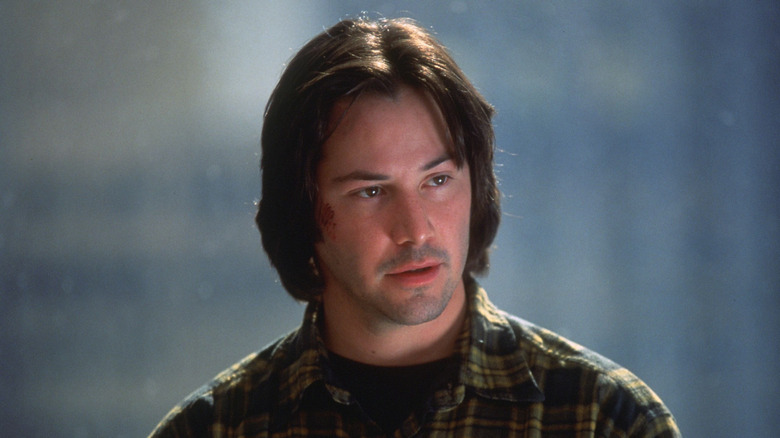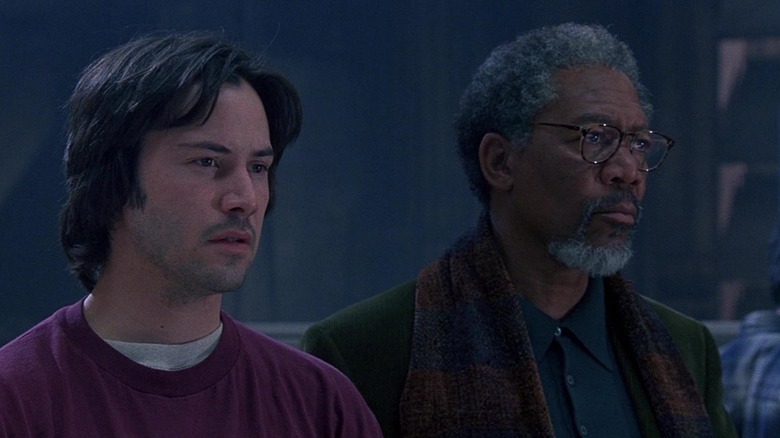The Sci-Fi Flop That Keanu Reeves Couldn't Believe He Made
In Andrew Davis' 1996 thriller "Chain Reaction," Keanu Reeves plays Eddie Kasalivich, a machinist at the University of Chicago who is overseeing a special scientific experiment to turn hydrogen into energy. Eddie isn't a genius, but he knows how the water-filled chain reaction chamber works. Then, one night, he accidentally discovers an obscure sound frequency that stabilizes the experiment and gets it to succeed. It seems that the world's energy supply issues are going to be solved.
Of course, this immediately kicks off a shadowy cover-up wherein the chain reaction chamber is blown up by unknown conspirators and Eddie is framed for the destruction. (The explosion takes out eight full city blocks.) Innocent scientists are killed, so Eddie has to go on the run with a physicist named Lily, played by Reeves at-the-time-future "Constantine" co-star Rachel Weisz. Naturally, they must find a way to prove their innocence and discover who would want to destroy their energy experiment. Morgan Freeman also appears as one of the conspirators.
If you don't remember "Chain Reaction," don't feel bad. It's kind of a forgettable movie that came and went in the late summer of 1996 without too many people noticing. Reeves hadn't gotten a crash course in kung fu for "The Matrix" yet and, thus, wasn't necessarily an assured box office draw, with the $50 million picture only earning a little over $60 million at the box office (which is, in Hollywood terms, a bomb). Rather, "Chain Reaction" was one of those movies that you were most likely to watch on cable TV in the late '90s. Back then, you might've even walked past several copies of "Chain Reaction" at a Blockbuster on your way to renting a more interesting movie. Even Reeves doesn't like "Chain Reaction."
The script for Chain Reaction was changed without Reeves' knowledge
In 2001, five years after "Chain Reaction" hit theaters, Reeves admitted to UPI the film had a host of problems, most of which stemmed from its script (which is credited to J.F. Lawton and Michael Bortman). He noted that he selects his acting roles based on the richness of his characters and/or the intricacy of the plot (as opposed to a movie's commercial potential) and that he signed on for "Chain Reaction" because he liked Eddie a lot. In the script he read, however, the character was closer to an archetypical Hitchcock protagonist, i.e. a wrongfully accused yet dangerously driven family man. That changed dramatically right before shooting began, leaving Reeves cold on the project. As he put it:
"[W]hen I got there, it was a different movie. Originally, I was married. I had this kid, and I did this research, and I didn't know that what I was researching had this effect. And someone got killed. And I had these regrets. And I'm trying to stop what I'm doing, but they can't let me, so they're chasing me. And then all of a sudden, I turn into this 24-year-old machinist. And I turned to Andrew Davis and I said, 'What happened to the movie I said yes to? What happened to that script? Where did that go?' And he said, 'No, I got something better,' and so I just had to go with it."
In the final film, Eddie is a much less interesting character, expressing little more than a generic action hero's steely determination. Reeves doesn't do a lot with the part, but then, there's not a lot one can do with a character like Eddie. Just like the movie around him, Eddie kind of sinks into the background, a forgettable element in a forgettable movie.
"Chain Reaction" has an 18% approval rating on Rotten Tomatoes based on 34 reviews. Most critics were quick to use the words "generic" and "formulaic" to describe it. It's a wholly unremarkable film, and this very article may be one of the few times in the last 30 years that someone has bothered to remark on it.

